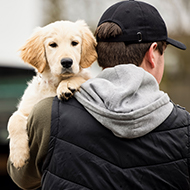
Law aims to better reflect that pets are not just property.
Ministers are considering new legislation that could mean tougher prison sentences for those found guilty of dog theft.
According to the PA news agency, the government's Pet Theft Taskforce is in the final stages of a report that will include recommendations to create a new offence of pet abduction.
Under the new law, anyone found guilty of pet theft could receive a maximum prison sentence of around five years.
The move comes in response to rising numbers of dog thefts in the UK, with calls from MPs and animal welfare campaigners for tougher penalties. Currently, pets are regarded in law as property, so their theft is treated in the same way as a stolen laptop or bike.
A government source said: “Instead of making a tokenistic change to the law, we have been listening to charities, breeders and the police to get a better understanding of what we need to do to tackle this awful crime.
“Part of the package will be a new offence to better reflect the fact that for most people, pets are not just property and having one stolen is traumatic for both the owner and the pet. A purpose-made new offence will do this and mean that those who steal pets will face tougher sentences than they do at the moment.”
The Pet Theft Taskforce was established in May 2021 to investigate the rise in stolen animals since the start of the pandemic. According to UK charity DogLost, reports of pet theft rose by 170 per cent in the last year, from 172 dogs in 2019 to 45 in 2020.
The Taskforce aims to gather evidence to understand the factors that may be contributing to the rise in thefts and to recommend any necessary measures to tackle the problem. It is expected to report on its findings and publish its recommendations in the coming months.



 The RCVS has announced a new version of its 1CPD mobile app, with enhanced features for veterinary surgeons and veterinary nurses to record their continuing professional development.
The RCVS has announced a new version of its 1CPD mobile app, with enhanced features for veterinary surgeons and veterinary nurses to record their continuing professional development.